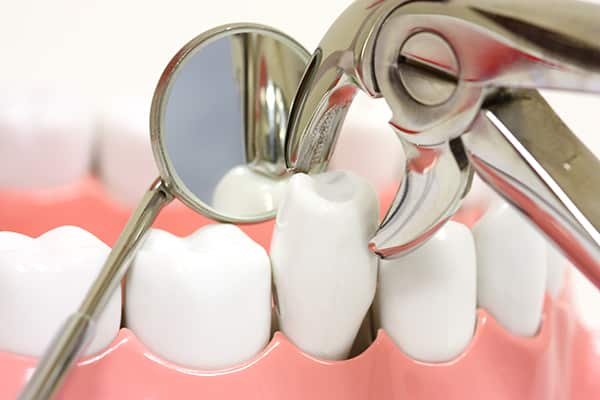Our Service
Although permanent teeth were meant to last a lifetime, there are a number of reasons why tooth extraction may be needed. A very common reason involves a tooth that is too badly damaged, from trauma or decay, to be repaired.:
Why extractions are done:
- Some people have extra teeth that block other teeth from coming in.
- Sometimes baby teeth don’t fall out in time to allow the permanent teeth to come in.
- People getting braces may need teeth extracted to create room for the teeth that are being moved into place.
- People receiving radiation to the head and neck may need to have teeth in the field of radiation extracted.
- People receiving cancer drugs may develop infected teeth because these drugs weaken the immune system. Infected teeth may need to be extracted.
- Some teeth may need to be extracted if they could become a source of infection after an organ transplant. People with organ transplants have a high risk of infection because they must take drugs that decrease or suppress the immune system.
- Wisdom teeth, also called third molars, are often extracted either before or after they come in. They commonly come in during the late teens or early 20s. They need to be removed if they are decayed, cause pain or have a cyst or infection. These teeth often get stuck in the jaw (impacted) and do not come in. This can irritate the gum, causing pain and swelling. In this case, the tooth must be removed. If you need all four wisdom teeth removed, they are usually taken out at the same time.
The extraction procedure involves:
Most extractions are done under a local anesthetics. Once the tooth is numb the dentist will use instruments to first loosen the tooth and the extract the tooth using forceps.
There are two types of extractions:
- A simple extraction is performed on a tooth that can be seen in the mouth. General dentists commonly do simple extractions. In a simple extraction, the dentist loosens the tooth with an instrument called an elevator. Then the dentist uses an instrument called a forceps to remove the tooth.
- A surgical extraction is a more complex procedure. It is used if a tooth may have broken off at the gum line or has not come into the mouth yet. Surgical extractions commonly are done by oral surgeons. However, they are also done by general dentists. The doctor makes a small incision (cut) into your gum. Sometimes it’s necessary to remove some of the bone around the tooth or to cut the tooth in half in order to extract it.
If you have any questions, please feel free to call us on 0800 279 9333


